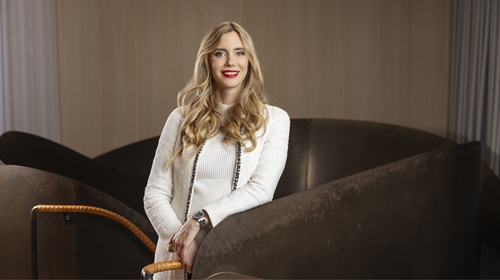NOVEMBER 17 2023
Against a backdrop of macroeconomic and geopolitical uncertainty, thousands of professionals gathered in Paris at the end of September 2023 for the annual IPEM Conference. In this Q&A, Lena Ulrich, Managing Director, Investor Relations (EMEA) at Nordic Capital Advisors, shares her reflections from the event, shedding light on the current private equity landscape.
The Private Equity (PE) industry as a whole has faced an enduring spell of economic turmoil, marking a departure from years of stability, steadfast performance and plentiful opportunities. This has, in turn, required PE investors to identify solutions that address inflation, high interest rates, and heightened regulatory scrutiny as well as re-evaluate their own investment strategies.
Despite this, PE remains the preferred strategy for LPs to target in 2024, according to the most recent IPEM Allocation and Fundraising Trend Report. In his opening remarks, Stephen Schwarzman, Chairman and CEO of Blackstone, commented on how current market conditions do not change the long-term trajectory for PE.
Against this economic backdrop, the highly anticipated IPEM enabled private equity professionals to come together to share insights and reflect on the trends and topics impacting the industry today.

In this Q&A, Lena Ulrich reflects on the industry and fundraising trends discussed at the event.
Q: Hi Lena! What were the main themes and talking points this year?
LU: Exit plans are, naturally, on top of everyone's mind. LPs are asking themselves how much they can commit and whether returns will be coming back out of the system. We see that there’s a heightened interest in other asset classes, for example credit funds and secondaries.
More generally, low risk allocations seem to be in demand.
Another talking point is the importance of high net-worth individuals, who are becoming more active in PE fundraising. Regulations are changing, opening up greater opportunities for reaching HNWIs and private investors, while still providing adequate protection. There was also less focus on ESG this year, perhaps because it has established itself as a standard practice within the industry. The feeling is that impact strategies must prove they can deliver returns to businesses and society. Accountability is a word that is used a lot.
Q: What was the sentiment among GPs and LPs?
LU: I would say moderately positive, definitely much better than in 2022. Among GPs, there is more focus on profitability and current trading in investment cases, and they are much more selective in sourcing processes. We’ve seen more cautious, slower dealmaking and more bilateral situations. Underwriting criteria has become stricter to cope with changing industry dynamics, as sellers wish to avoid failed auctions and buyers engage more selectively.
The investor base in Europe, more generally, is very sophisticated. They’ve gone through cycles and learned from past experiences that by not investing in difficult years, you often miss out on great vintages. Most LPs seek to invest at a consistent pace – after last year’s extreme circumstances, most are now looking to get back to avoid massive gaps in their portfolios. LPs are looking for GPs with a proven and solid ability to create value and genuine subsector knowledge. These are always attractive features, but never more so than in uncertain times.
The demand for European strategies also seems to be coming back, as many LPs are underexposed to Europe after putting emphasis on the US in recent years. More generally, we see a clear bifurcation in the market, where large managers continue to raise successfully and others are not getting over the finish line.
Q: Is there a trend towards increased specialisation?
LU: Yes. It is clear that the specialist is the new generalist. You need to bring much more profound knowledge and understanding at the subsector level to create genuine value. LPs increasingly evaluate their partners from a sector perspective, seeking operational expertise in areas such as healthcare, technology, and business services, on top of emerging sectors such as sustainability and AI.
This has manifested itself clearly – in this challenging market, specialism is key.
There is also a strong preference for the mid-market, particularly in Europe. As I see it, the midmarket strategy and the market's response to Nordic Capital Evolution is a testament to this.
Q: Are GPs rethinking their strategies?
LU: Well, it looks that way. GPs, naturally, have had to update their playbooks to meet the shifting demands of LPs, optimise their portfolios, lower their exposure and volatility, and produce strategies fit for today’s market.
Whereas the current market is demanding and presents structural challenges to GPs, there will be lots of exciting opportunities for those who adapt quickly and can navigate in this environment.
Q: How is Nordic Capital handling the changing environment?
LU: Nordic Capital’s long-term strategy is designed to cope with the current environment and mitigate against external pressures. By deeply specialising in subsectors, investment opportunities can be selected confidently and this core strategy is closely followed.
The advisory teams have become more specialist over the years, focusing not just on specific industries but on selected subsectors and segments where we have genuine expertise and can create value. Even within typically hot sectors such as Tech or Healthcare, there is now a need to double click and differentiate between particular segments, for example identifying the cash flow positive businesses in Tech or Healthcare businesses that clearly demonstrate secular growth trends.
In 2017, Nordic Capital redefined the strategy for industrial and business services, and we also took the decision to discontinue investing in the consumer space.
In terms of business ownership, Nordic Capital’s portfolio companies have displayed strong resilience in the face of macro impact, with positive top-line growth. In times like this, a genuine focus on operational support and improvement comes to the fore. We have done a lot of work to insulate the portfolio from negative impact and provide a strong base for future growth.
